Israel moving to ‘full offense’ against Hamas: ‘Gaza will never go back to what it was’
Shelling on the Strip intensifies and Hamas responds with a barrage of rockets on Ashkelon. Syria and Lebanon fire shells on Israeli territory
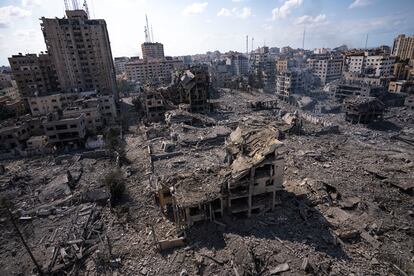
Israeli Defense Minister Yoav Gallant said Tuesday that Israel is heading for a “full offense” in the Gaza Strip, after intensifying the severity of its bombardment and killing two leaders of Hamas, the armed Islamist organization that on Saturday launched the most lethal attack in Israel’s living memory. In the images coming from the Palestinian territory, entire blocks of buildings appear to have been reduced to rubble, despite the fact that’s where militants in the Gaza Strip are holding at least 130 Israelis, who were captured in the operation.
Rockets have also begun to be fired at Israel from Lebanon (15 on Tuesday) and Syria (three) by a Palestinian faction, according to a source in the southeast of the country quoted by Reuters. In both cases, Israel responded with shelling. In addition, at 5 p.m. local time, the armed wing of Hamas — the Izzedine al-Qassam Brigades — launched, as it had warned, a barrage of rockets on Ashkelon, a city in southern Israel with a population of 170,000. Late Tuesday afternoon, the Gaza Health Ministry said that the number of people who had been killed in the Gaza Strip since Saturday had risen to 900, including 260 children and 230 women, while 4,600 had been wounded.
“I have removed every restriction, we have [regained] control of the area, and we are moving to a full offense,” Gallant said in an address to troops along the Gaza border, in statements reported by local media. “You will have the ability to change the reality here. You have seen the prices [being paid], and you will get to see the change. Hamas wanted a change in Gaza; it will change 180 degrees from what it thought. They will regret this moment, Gaza will never go back to what it was.”
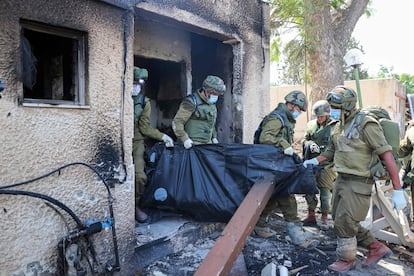

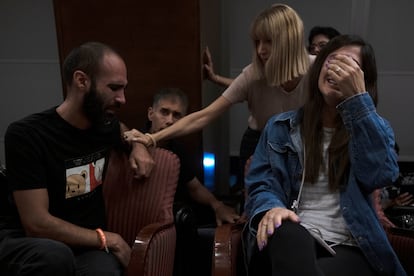


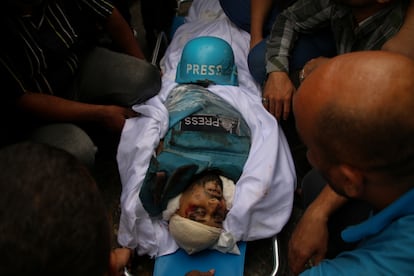
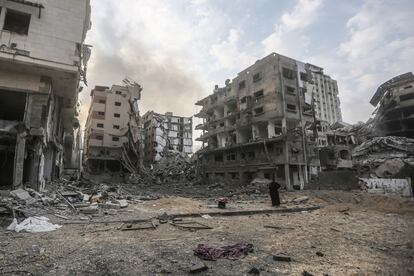
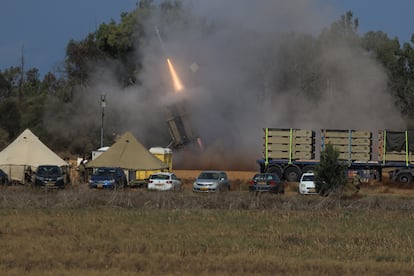

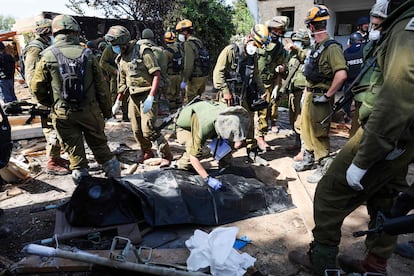
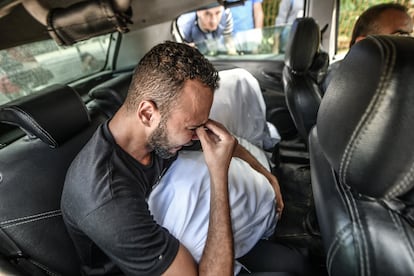

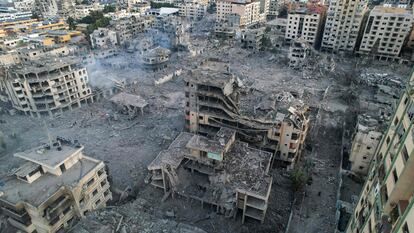

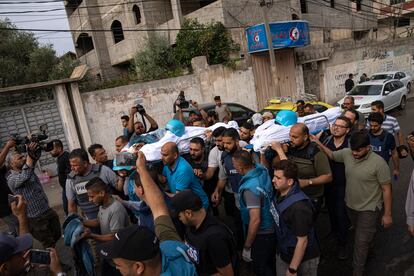
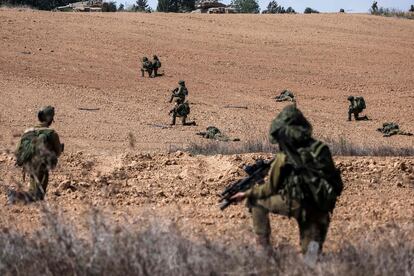
Earlier on Tuesday, Richard Hecht, the international spokesperson for the Israeli Defense Forces (IDF), said that the military was “focusing on the offensive phase” and were in the process of building infrastructure for future operations, after evacuating almost all the inhabitants of the localities in the vicinity of Gaza and regaining control of the entire territory, except for “very few” Palestinian militants. Later in the day, the army reported that it killed three of militants during fighting — with the support of a drone and a helicopter — in the area of the city of Ashkelon. Israel claims to have stopped new infiltrations in the last 24 hours. After evacuating towns near the Gaza border, Israel said that it recovered the bodies of 1,500 Hamas militants who infiltrated in Saturday’s surprise operation. The latest government casualty toll puts the death toll in Israel at 1,200 and the number of wounded at more than 2,700.
In Gaza, some 200,000 of the 2.2 million inhabitants have already sought refuge, either because they have lost their homes or because they want to escape Israel’s intensifying air and naval bombardments and the foreseeable land incursion. Many of these refuges are in schools run by UNRWA, the United Nations agency for Palestinian refugees. Gaza, where the death toll so far stands at 830, has been completely blocked off since Monday, when Israel cut off food, electricity and fuel supplies.
The United Nations Office for the Coordination of Humanitarian Affairs (OCHA) was reporting an increase in the last 24 hours of mass displacement and says it will continue to increase. On Tuesday, Egypt closed “until further notice” the only border crossing with Gaza not controlled by Israel, Rafah. It was barely functioning as of late Monday after being bombed. Under normal conditions, only a few Palestinians manage to get through this crossing (after long lines and often with bribes). On Monday, only those with an exit permit were allowed to cross into Egypt.
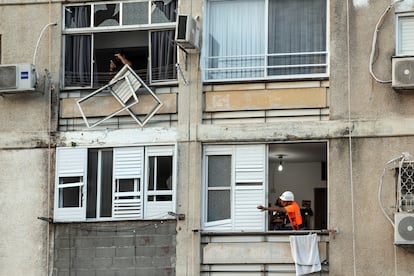
“We are going to act very severely,” Hecht said in a video conference with journalists. The army later clarified that Rafah is in fact closed and that it was not an official call for Gaza residents to flee to Egypt.
Hamas, for its part, stated Monday that it will begin executing an Israeli civilian hostage for every new airstrike that Israel launches without warning. This refers to the firing of small missiles — usually with very little explosive charge — shortly before the actual bombardment, so that civilians can run away.
According to the Israeli military, two Hamas officials were killed in an airstrike. Yoad Abu Shmala was the Minister of Economy in the Gaza government (in Hamas hands since 2007) and Zakaria Abu Maamar, the head of the internal relations department. Both belong to Hamas’ political office, not the military branch. An official Hamas source confirmed the deaths to Reuters.
Three journalists killed
Three Palestinian journalists have also been killed. Said al-Taweel, Mohammed Sobboh and Hisham Nawajhah were killed in a bombing that hit a residential building near the fishing port of the Gaza capital, the local journalists’ union reported.
UN High Commissioner for Human Rights Volker Türk on Tuesday condemned the total siege of the Gaza Strip. “The imposition of sieges that endanger the lives of civilians by depriving them of goods essential for their survival is prohibited under international humanitarian law,” he said in a statement.
Sign up for our weekly newsletter to get more English-language news coverage from EL PAÍS USA Edition
Tu suscripción se está usando en otro dispositivo
¿Quieres añadir otro usuario a tu suscripción?
Si continúas leyendo en este dispositivo, no se podrá leer en el otro.
FlechaTu suscripción se está usando en otro dispositivo y solo puedes acceder a EL PAÍS desde un dispositivo a la vez.
Si quieres compartir tu cuenta, cambia tu suscripción a la modalidad Premium, así podrás añadir otro usuario. Cada uno accederá con su propia cuenta de email, lo que os permitirá personalizar vuestra experiencia en EL PAÍS.
¿Tienes una suscripción de empresa? Accede aquí para contratar más cuentas.
En el caso de no saber quién está usando tu cuenta, te recomendamos cambiar tu contraseña aquí.
Si decides continuar compartiendo tu cuenta, este mensaje se mostrará en tu dispositivo y en el de la otra persona que está usando tu cuenta de forma indefinida, afectando a tu experiencia de lectura. Puedes consultar aquí los términos y condiciones de la suscripción digital.









































